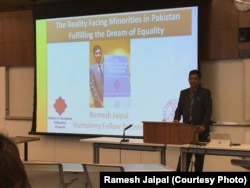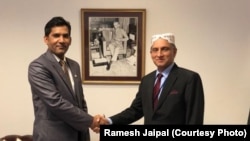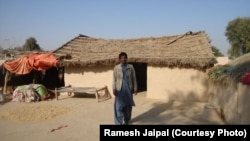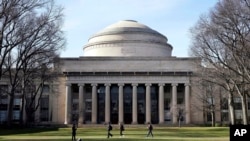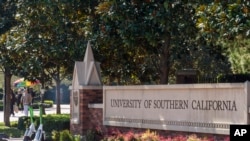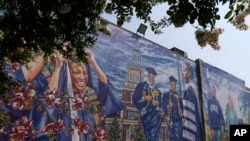Student Union
Camel Driver to Law Student: One Man's Amazing Journey
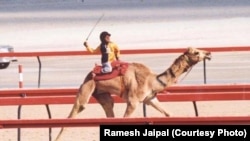
Desperate to feed their family, Ramesh Jaipal's parents sold him to a business in Dubai to help train and scrub camels for 10,000 Pakistani rupees a month.
He was 5.
"I deserved love, I deserved education and I deserved a family, but I was scrubbing camels and racing them in the scorching temperatures of 106 degrees (Fahrenheit/41 degrees Celsius)," Jaipal told VOA.
Because the United Nations was retrieving boys and girls like Jaipal from servitude and returning them home, he was able to go to school, but only up to the eighth grade.
Jaipal was also a rickshaw driver, a motor mechanic's assistant, a newspaper vendor, a shoe polisher and a car washer until he worked his way up the education ladder, receiving master's degrees in political science and sociology from Shah Abdul Latif University in Khairpur, Pakistan.
This year, Jaipal, 34, completed the most recent leg on his worldwide journey: as a fellow in the prestigious Hubert Humphrey Fellowship program to study law and human rights at American University's College of Law.
"I can never forget that I was once a camel jockey. … Today, I know for a fact that I am the only one among the thousands who would race for their lives like me, to make it to this point. Studying in America is a privilege, and only I have it among all of my fellow jockeys. It is an honor and it surely is a dream that is fulfilled."
The fellowship, administered by the U.S. Department of State, provides a $1,500 to $1,700 monthly stipend for study and living expenses.
"My family was dirt poor. I was the only son of my parents at the time, and I was hired on a salary of 10,000 Pakistani rupees [$200] a month," he recalled. "What more could my father ask for? He had to feed a family of four at the time."
Jaipal and his family are Dalit Hindus who lived in one of the poorest districts of Pakistan's predominately Muslim Punjab province, he told VOA in an interview at his apartment in Silver Spring, Maryland. For decades, southern Punjab has been a target for child trafficking.
According to reports, more than 3,000 children as young as 3 years old from Pakistan, Bangladesh, Sri Lanka and Sudan were smuggled to United Arab Emirates to serve as jockeys for the popular camel-racing sport in the oil-rich Gulf states. UNICEF and other nongovernmental organizations have returned many of these children to their families.
Jaipal says young children like himself were underfed and inadequately clothed, lacked strength and energy, and faced substantial health risks. That made them perfect for the job.
"I was fit for the job because I was physically unfit," he explained. "I was weak, and I was underweight, and I could make a camel run very fast. The sheikhs, who would train us, would not know Urdu, but they did know how to say 'maaro' or 'hit the camel' in my [native Urdu]. They would hit me to teach me so that I could hit the camel to make it run even faster."
When he was 8, he was forced to race an untrained camel in the desert. He suffered a head injury when the camel tried unsuccessfully to throw him off his back — an injury he still suffers from today. Despite his head trauma, Jaipal was forced to work a few more years. In 1995, when he was 11 years old, he was rescued by UNICEF and other child advocates.
Returned to parents who sold them
"Call it extreme poverty, lack of education or blame it on the system, but the truth is that most of the children who would go for this sport to UAE were actually sent there because the parents would sell them," said Sarim Burney, chairman of a trust that battles human trafficking in Pakistan. "And we would hand over these children to such parents upon their return."
No children are trafficked or smuggled from Pakistan to UAE for camel racing anymore, Burney says. But he remains concerned that several of the recovered children remain missing.
"I wish we could put a check on how these children were later treated by their parents," Burney said.
Jaipal says part of his life's mission will be to fight against child abuse in Pakistan today.
According to the 1998 Pakistani census, Jaipal's home district of Rahim Yar Khan has a population of 200,000 Meghwar people, also known as Dalits, or lower-caste Hindus. Jaipal says that the kidnapping and forced conversion of little Hindu girls to Islam has risen at an alarming rate in South Punjab and parts of Sindh.
"As a result, people have stopped sending their girls to school. … Here in America, I have learned how to lobby for a cause," he said.
Jaipal, with all his ambitions and dreams, is soon returning to his family in Pakistan.
"The exploitations and excesses I have faced in my country and by my family is my internal issue. I will keep fighting," he said.
"A day will come when the people of my community and of all the minorities of Pakistan won't have to face what I faced. My scars and wounds that I endured along the way will keep me remembering that I belong to Pakistan, which to me is the best place on Earth."
See all News Updates of the Day
US remains top choice for Indian students going abroad
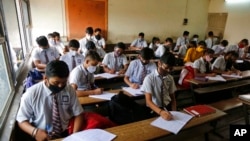
About 69% of Indian students traveling abroad for their studies chose the United States, according to a Oxford International’s Student Global Mobility Index. Other popular choices were the United Kingdom, Canada and Australia.
Education Times reports the main influencers for deciding where to study abroad – for Indian students and others – were parents. (April 2024)
Malaysian official: Schools can’t turn away from global tensions

Zambry Abdul Kadir, Malaysia’s higher education minister, said protests spreading across universities in the United States show that schools can’t ignore political tensions.
Helen Packer, reporting in Times Higher Education, said the minister reminded educators that universities are key in the development of leaders, individuals and societies. (April 2024)
Social media breaks are difficult, but necessary

Between online classes, maintaining social connections and working on projects, college students can have a hard time disengaging from the demands of technology.
In Florida International University’s PantherNOW, Ariana Rodriguez offers strategies for taking a break from social media. (April 2024)
- By Melos Ambaye
Many master's degrees aren't worth the investment, research shows
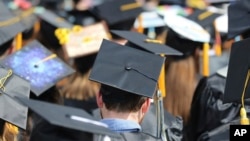
Nearly half of master's degrees have a negative financial return, according to new research by the Foundation for Research on Equal Opportunity, an economic research organization.
The study indicates that many graduate degree programs do not increase lifetime earnings enough to be worth it.
While 23% of bachelor’s degree programs yield a negative financial return on investment, 43% of two-year degrees and master’s degrees fail to deliver a return, according to the study by Preston Cooper, a senior fellow at FREOPP.
Cooper assessed the return on investment for 53,000 degree and certificate programs to determine whether a student’s lifetime earnings outweigh program costs and the risk of not completing their degree.
His findings show that a student’s field of study was the overriding indicator of return on investment at the undergraduate and graduate level.
Engineering, computer science and nursing bachelor’s degrees have high financial returns on investment, while programs in education, fine arts, psychology and English usually have low returns.
Graduate degrees in medicine and law tend to have strong payoffs. But a large share of master’s programs, including the MBA, frequently have low payoffs, according to Cooper.
Although workers with master’s degrees earn 16% more than those with only bachelor’s degrees, Cooper says the figure fails to account for students who had “higher preexisting earnings potential.”
“MBA students typically have high preexisting earnings potential, having often chosen high-ROI undergraduate majors such as finance and economics,” Cooper writes. “So the MBA adds little value on top of that.”
The study indicates that high starting salaries are predictors of high returns on investment. Degrees with starting salaries of $57,000 a year or more deliver the best lifetime returns.
But the return on investment of a degree can vary depending on the educational institution.
“Students interested in fields with low average pay can still find some schools that do well transforming those fields of study into high-paying careers,” Cooper writes.
The quality of an institution also matters, said William Tierney, professor emeritus of higher education at the University of Southern California.
“An MBA from Harvard is a likely ticket to a good job,” Tierney told VOA. “An MBA from the University of Phoenix, less so.”
But students pursue graduate programs for more than just financial reasons.
“Some degrees open up careers in fields that students may enjoy, such as in the performing arts,” Robert Kelchen, head of educational leadership at the University of Tennessee, Knoxville, told VOA.
“Others can help gain access to social networks or simply help students learn about a topic that is of interest,” Kelchen added.
Cooper told VOA that it might make sense for students in degree programs with low returns on investment to switch majors if they can still graduate on time.
He found the worst outcome for a student’s return on investment is dropping out of college “because they must pay for one or more years’ tuition and spend time out of the labor force.”
Lawmakers who fund higher education have a responsibility in ensuring “higher education delivers on its promise of economic mobility,” Cooper said.
Nearly a third of federal funding, including Pell grants and student loans, pays for higher education programs that fail to provide students with a return on investment, according to the study.
Cooper’s view is that “some schools should shut down low-ROI programs and reallocate institutional resources to programs with a better return.”
“There's definitely this narrative out there that higher education is always worth it, and you should always try to get that extra degree because it will increase your earnings,” he told VOA. “That's reinforced by colleges who make lofty promises regarding their graduate degree programs' outcomes, which all too often fall short.”
Harvard students end protest as school agrees to discuss Gaza conflict
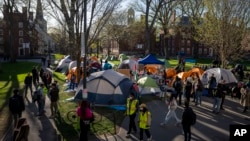
Protesters against the war between Israel and Hamas were voluntarily taking down their tents in Harvard Yard on Tuesday after university officials agreed to discuss their questions about the endowment, bringing a peaceful end to the kinds of demonstrations that were broken up by police on other campuses.
The student protest group Harvard Out of Occupied Palestine said in a statement that the encampment "outlasted its utility with respect to our demands." Meanwhile, Harvard University interim President Alan Garber agreed to pursue a meeting between protesters and university officials regarding the students' questions.
Students at many college campuses this spring set up similar encampments, calling for their schools to cut ties with Israel and businesses that support it.
The Israel-Hamas war began when Hamas and other militants stormed into southern Israel on October 7, killing some 1,200 people and taking 250 hostages. Palestinian militants still hold about 100 captives, and Israel's military has killed more than 35,000 people in Gaza, according to Gaza's Health Ministry, which doesn't distinguish between civilians and combatants.
Harvard said its president and the dean of the Faculty of Arts and Sciences, Hopi Hoekstra, will meet with the protesters to discuss the conflict in the Middle East.
The protesters said they worked out an agreement to meet with university officials, including the Harvard Management Company, which oversees the world's largest academic endowment, valued at about $50 billion.
The protesters' statement said the students will set an agenda that includes discussions on disclosure, divestment, reinvestment and the creation of a Center for Palestine Studies. The students also said that Harvard has offered to retract suspensions of more than 20 students and student workers and back down on disciplinary measures faced by 60 more.
"Since its establishment three weeks ago, the encampment has both broadened and deepened Palestine solidarity organizing on campus," a spokesperson for the protesters said. "It has moved the needle on disclosure and divestment at Harvard."




